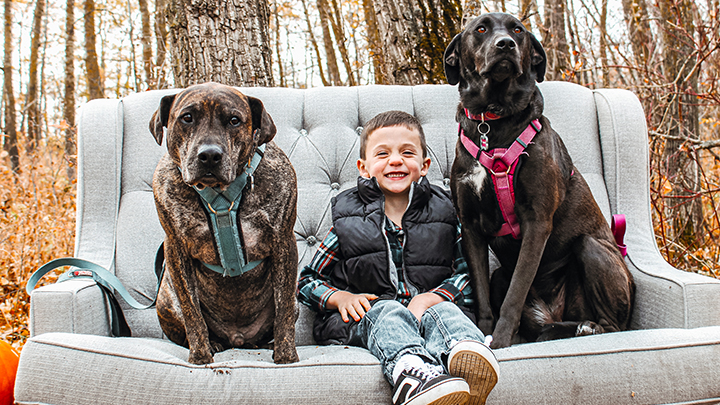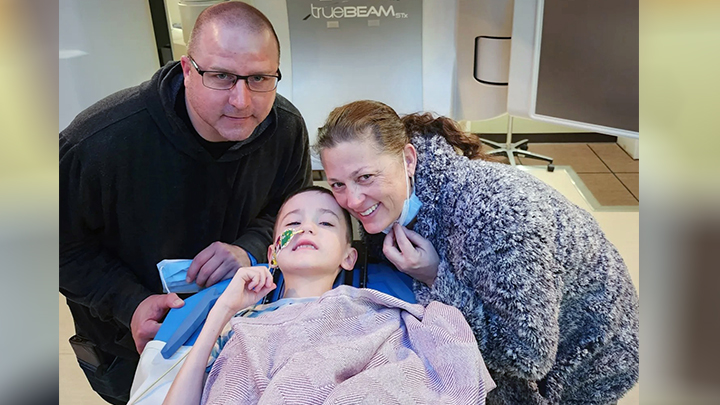
April 19, 2024

Karter Bourgeault’s tissue donation saved two lives. Photo by Nicole Fraser.

Karter Bourgeault with his parents, Richard Bourgeault and Nicole Fraser. Photo by Nicole Fraser.
Story by Su-Ling Goh | Photos by Nicole Fraser
EDMONTON — A six-year-old boy has saved the lives of two babies — by donating his heart valves after his death.
Karter Bourgeault was diagnosed with diffuse intrinsic pontine glioma (DIPG), a rare and aggressive brain tumour, in July 2022. On Sept. 26 that year, he spent his sixth birthday in radiation treatment. In total, the little Edmonton Oilers fan endured more than 30 rounds of radiation at the Cross Cancer Institute, where staff tried to lift his spirits with what he enjoys most.
“He got two radiation masks because he went to radiation twice,” says his father, Richard Bourgeault. “The first one was a Connor McDavid mask, then he met (Edmonton Oiler) Tyson Barrie during school and he wanted a Tyson Barrie mask.”
Life expectancy after a DIPG diagnosis is less than two years. Karter deteriorated from a happy child — a boy who loved to swim, wrestle with his dad and play ninjas — to no longer being able to walk or talk. He was accepted into a clinical trial for a new treatment in New Jersey which relieved some of his pain, but he had seizures and was transported back to Edmonton. In summer 2023, a year after his diagnosis, Karter died at home in his parents’ arms.
“One thing that Richard and I decided from the minute that we got his diagnosis is that this wasn’t going to be for nothing,” says his mother, Nicole Fraser. “We weren’t going to let our son suffer, pass away for no reason. We wanted to be able to help any way that we can.”
Karter’s parents donated his brain and tumours to DIPG research, and his heart valves to the AHS Comprehensive Tissue Centre (CTC). His valves were transplanted into two babies with heart defects, saving their lives.
“With children and babies, (heart valves are) a very rare donation that we get,” says Candice Bohonis, CTC supervisor. “It’s a very hard decision for a parent to make at the time of death. It’s a tragic, horrible time in their lives, but the parents who do choose donation find a lot of value and comfort with donating those tissues. And it helps specifically other babies and children, which helps (donor) parents through their grief as well.”
Across Canada, there is a constant shortage of tissues for patients who need them. While only one to two per cent of people are eligible to donate organs after they die, most can be considered for tissue donation, including patients with cancer.
Tissues that can be donated include eyes, bone, connective tissue and placenta, along with skin and heart valves which can be life-saving. All tissue banks are always short on pediatric-sized heart valves.
Karter’s parents have found a bit of comfort in knowing their boy saved two babies, sparing other families from profound pain.
“For myself, it gives me a little bit of peace to know he was able to (donate),” says Nicole. “(Recipients) could have a longer life. No child should have to lose their life at six-and-a-half-years-old, or at any young age. And no parent should have to bury their child.”
“If I can help someone else, maybe their kid lives,” adds Richard. “I wanted to donate everything I could, to keep as much of (Karter) alive as possible.”
To learn more about organ and tissue donation, visit GiveLifeAlberta.ca.